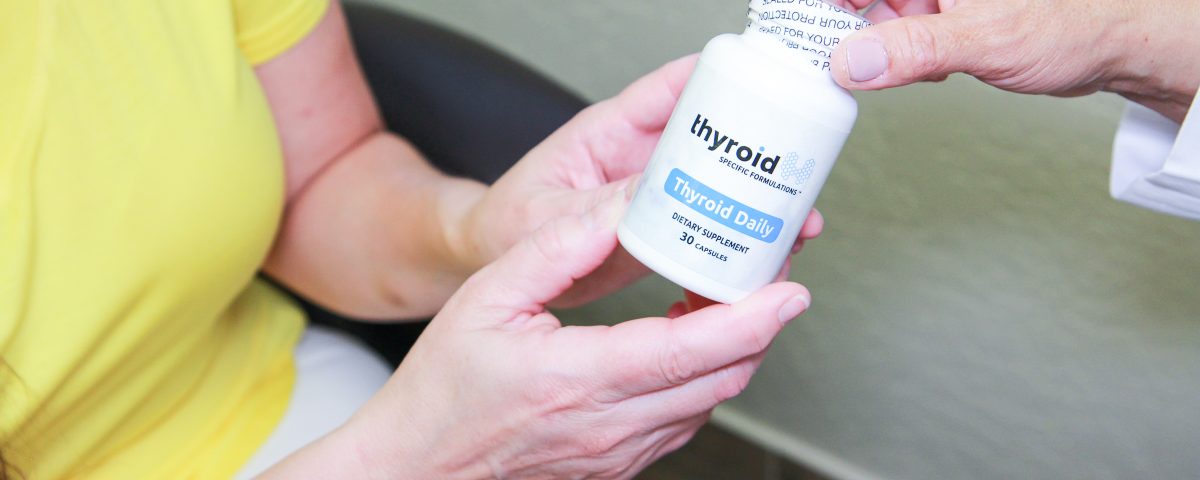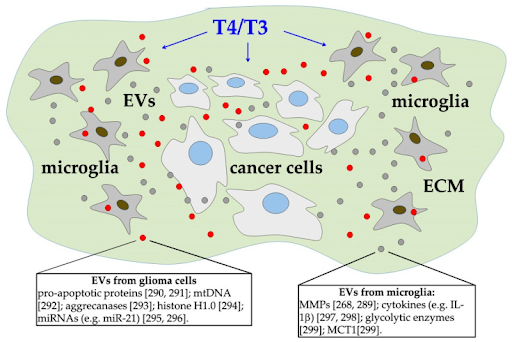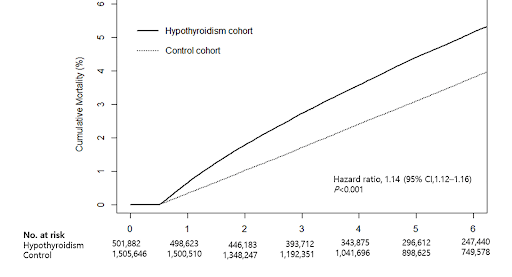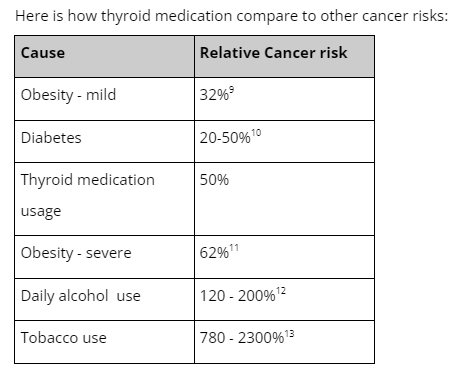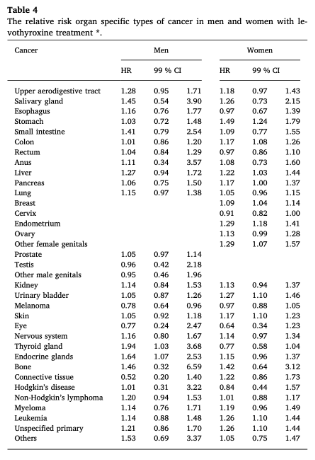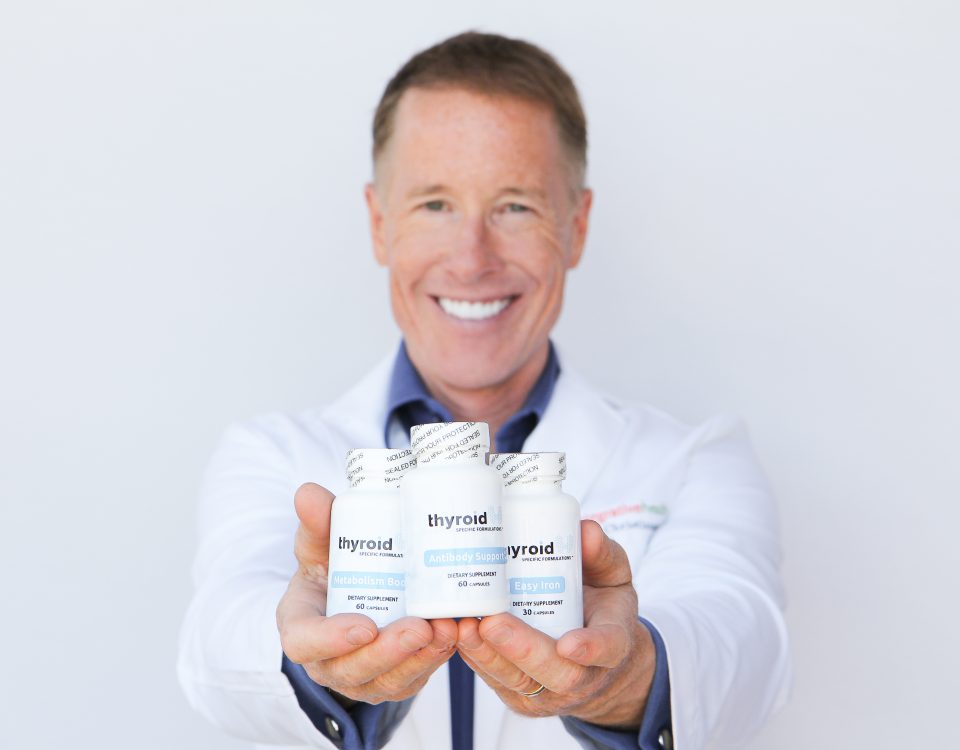1 – Uzair I.D., Grand J.C., Flamini M.I., Sanchez A.M. Molecular Actions of Thyroid Hormone on Breast Cancer Cell Migration and Invasion via Cortactin/N-WASP. Front. Endocrinol. 2019;10:139. doi: 10.3389/fendo.2019.00139.
2 – Khan S.R., Chaker L., Ruiter R., Aerts J.G.J.V., Hofman A., Dehghan A., Franco O.F., Stricker B.H.C., Peeters R.P. Thyroid function and cancer risk: The Rotterdam Study. J. Clin. Endocrinol. Metab. 2016;101:5030–5036. doi: 10.1210/jc.2016-2104.
3 – Liu Y.C., Yeh C.T., Lin K.H. Molecular Functions of Thyroid Hormone Signaling in Regulation of Cancer Progression and Anti-Apoptosis. Int. J. Mol. Sci. 2019;20:4986. doi: 10.3390/ijms20204986.
4 – Schiera G, Di Liegro CM, Di Liegro I. Involvement of Thyroid Hormones in Brain Development and Cancer. Cancers (Basel). 2021;13(11):2693. Published 2021 May 30. doi:10.3390/cancers13112693
5 – Schiera G, Di Liegro CM, Di Liegro I. Involvement of Thyroid Hormones in Brain Development and Cancer. Cancers (Basel). 2021;13(11):2693. Published 2021 May 30. doi:10.3390/cancers13112693
6 – Hercbergs A.H., Ashur-Fabian O., Garfield D. Thyroid hormones and cancer: Clinical studies of hypothyroidism in oncology. Curr. Opin. Endocrinol. Diabetes Obes. 2010;17:432–436. doi: 10.1097/MED.0b013e32833d9710.
7 – Trodello C., Higgins S., Ahadiat O., Wysong A. Hypothyroidism as a risk factor for cancer: A systematic review and implications for future studies. Cancer Sci. Res. Open Access. 2017;4:1–7. doi: 10.15226/csroa.2017.00136.
8 – Sohn SY, Seo GH, Chung JH. Risk of All-Cause Mortality in Levothyroxine-Treated Hypothyroid Patients: A Nationwide Korean Cohort Study. Front Endocrinol (Lausanne). 2021;12:680647. Published 2021 May 13. doi:10.3389/fendo.2021.680647
9 – Basen-Engquist K, Chang M. Obesity and cancer risk: recent review and evidence. Curr Oncol Rep. 2011 Feb;13(1):71-6. doi: 10.1007/s11912-010-0139-7. PMID: 21080117; PMCID: PMC3786180.
10 – Giovannucci E, Harlan DM, Archer MC, et al. Diabetes and cancer: a consensus report. Diabetes Care. 2010;33(7):1674-1685. doi:10.2337/dc10-0666
11 – Basen-Engquist K, Chang M. Obesity and cancer risk: recent review and evidence. Curr Oncol Rep. 2011 Feb;13(1):71-6. doi: 10.1007/s11912-010-0139-7. PMID: 21080117; PMCID: PMC3786180.
12 – Bagnardi V, Rota M, Botteri E, et al. Alcohol consumption and site-specific cancer risk: A comprehensive dose-response meta-analysis. British Journal of Cancer 2015; 112(3):580–593.
13 – Pesch B, Kendzia B, Gustavsson P, Jöckel KH, Johnen G, Pohlabeln H, Olsson A, Ahrens W, Gross IM, Brüske I, Wichmann HE, Merletti F, Richiardi L, Simonato L, Fortes C, Siemiatycki J, Parent ME, Consonni D, Landi MT, Caporaso N, Zaridze D, Cassidy A, Szeszenia-Dabrowska N, Rudnai P, Lissowska J, Stücker I, Fabianova E, Dumitru RS, Bencko V, Foretova L, Janout V, Rudin CM, Brennan P, Boffetta P, Straif K, Brüning T. Cigarette smoking and lung cancer–relative risk estimates for the major histological types from a pooled analysis of case-control studies. Int J Cancer. 2012 Sep 1;131(5):1210-9. doi: 10.1002/ijc.27339. Epub 2011 Dec 14. PMID: 22052329; PMCID: PMC3296911.
14 – Wu CC, Islam MM, Nguyen PA, et al. Risk of cancer in long-term levothyroxine users: Retrospective population-based study. Cancer Sci. 2021;112(6):2533-2541. doi:10.1111/cas.14908
15 – Thvilum M, Brandt F, Almind D, Christensen K, Hegedüs L, Brix TH. Excess mortality in patients diagnosed with hypothyroidism: a nationwide cohort study of singletons and twins. J Clin Endocrinol Metab. 2013;98(3):1069-1075. doi:10.1210/jc.2012-3375
16 – Wu CC, Yu YY, Yang HC, et al. Levothyroxine use and the risk of breast cancer: a nation-wide population-based case-control study. Arch Gynecol Obstet. 2018;298(2):389-396. doi:10.1007/s00404-018-4837-y
17 – Wändell P, Carlsson AC, Li X, Sundquist J, Sundquist K. Levothyroxine treatment is associated with an increased relative risk of overall and organ specific incident cancers – a cohort study of the Swedish population. Cancer Epidemiol. 2020;66:101707. doi:10.1016/j.canep.2020.101707
18 – Hung, S.-H., Chung, S.-D., & Lin, H.-C. (2017). Thyroxin Use Is Associated With Increased Risk of Thyroid Cancer in Patients With Hypothyroidism. The Journal of Clinical Pharmacology, 58(1), 29–33. doi:10.1002/jcph.972




